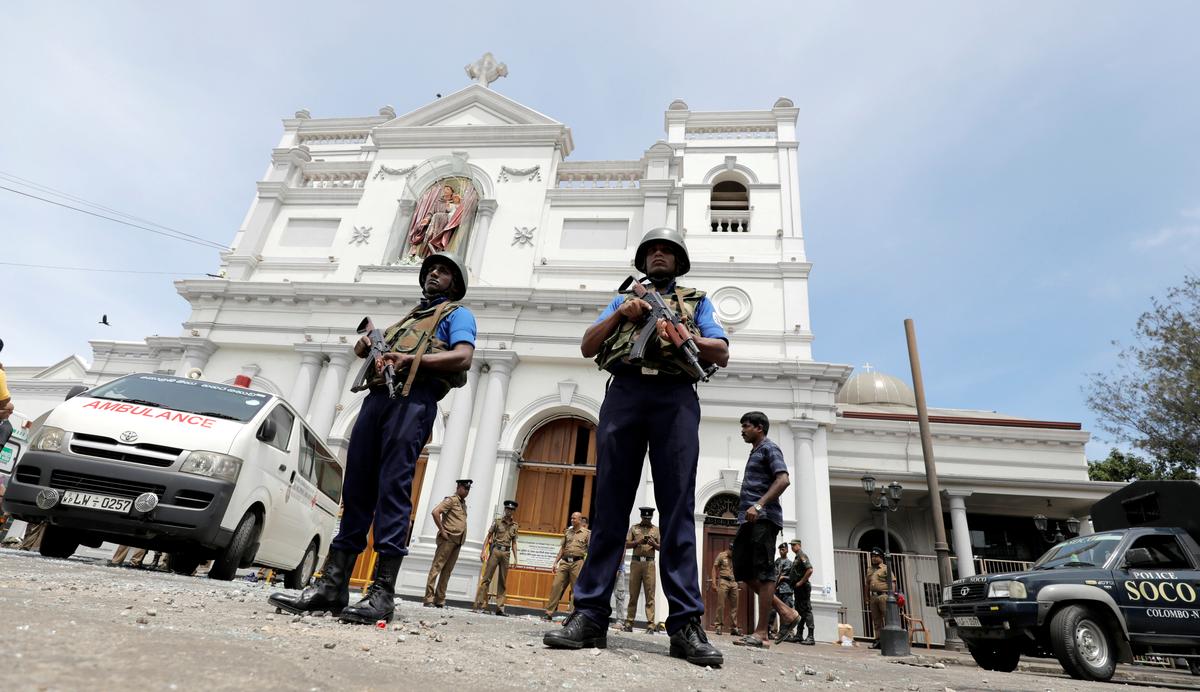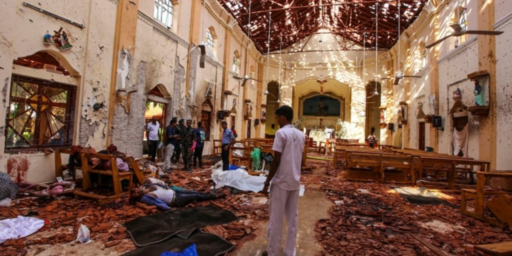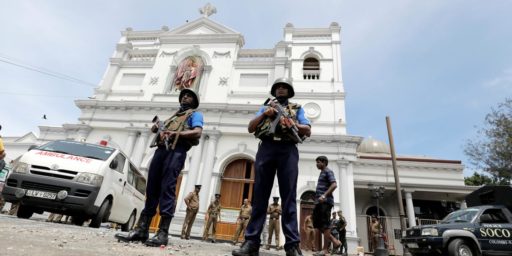Sri Lanka Ignored Warnings Of Potential Terror Attack
Evidence is emerging that the Sri Lankan government had advance warning regarding potential terror attacks but failed to act on the information.

In the wake of the attacks on Sunday that resulted in the deaths of hundreds of churchgoers and others in Sri Lanka, The New York Times is reporting that the Sri Lankan government apparently had at least some warning of potential attacks but failed to act on them:
Within hours of when three churches and three hotels were bombed, Sri Lankan security services seized at least 24 suspects, implying that they knew exactly where this group had been operating and were quickly able to locate its safe houses.
Why the security agencies failed to act before the bombings — and why some top officials, including the country’s own prime minister, didn’t even know about the intelligence that the agencies possessed — are enormous questions that have created a crisis in the Sri Lankan government.
Its history of bitter infighting appears to have contributed to a spectacular security blunder that led to one of the world’s deadliest terrorist attacks.
On Monday, several ministers lashed out at President Maithripala Sirisena, who controls the security services, for not acting on the detailed warnings before the attacks.
“We are ashamed of what has happened,” said Rauff Hakeem, the minister of city planning. “If the names of the persons involved were already known, why were they not arrested?”
He called the attacks a “colossal failure on the part of the intelligence services.”Several ministers are now calling for the national police chief to resign.
Shiral Lakthilaka, a senior adviser to President Sirisena, denied that there had been any security lapses. “Everyone has done their job,” he said. “These kinds of alerts are coming time to time. Even U.S. or anyone will not try to panic people.”But he added that the president had appointed a special committee, led by a Supreme Court judge, to investigate the matter. And he acknowledged that the warnings about National Thowheeth Jama’ath — disclosed in a leaked memo from a top police official to division heads and dated April 11 — had been circulated only among police officials in charge of “VIP security.”
“That is why the president has appointed the committee to understand and ascertain what went wrong,” Mr. Lakthilaka said.
The warnings appear to have gone back even further. India, a close ally of Sri Lanka’s, has been watching the entire South Asia region for any sign of activity by Al Qaeda or the Islamic State. Indian security agencies shared specific intelligence about National Thowheeth Jama’ath and the possibility of suicide attacks with their Sri Lankan counterparts as early as April 4, two officials said.
But with Sri Lanka’s president and prime minister feuding for months, resulting in a political breakdown last year, it seems the president shut out the prime minister from top security briefings and that the prime minister’s office had no inkling of the warnings of imminent suicide attacks.
On Monday, the country remained on edge. At a crowded bus station in the capital, Colombo, police officers found 87 bomb detonators.
(…)
A majority Buddhist nation, Sri Lanka has been mostly spared the religious-driven bloodshed of other South Asian nations, such as India and Pakistan.
But in recent years some Buddhist monks have turned militant and incited followers to attack Muslims, their places of worship and some of their businesses, such as slaughterhouses. The Sri Lankan government’s security services appeared to have turned a blind eye, allowing Buddhist mobs to act with impunity.
In 2014, scores were injured and three people were killed in Buddhist-Muslim clashes. In response, some Muslims joined radical Islamist groups that they believed would defend their faith.
According to the April 11 security memo, National Thowheeth Jama’ath’s leader, Mohammed Zaharan, had been under close watch for several days. Sri Lankan security officials have blamed his group or allied groups for vandalizing Buddhist statues in December, a serious crime that was seen as an attempt to instigate bloodshed between Buddhists and Muslims.
As with James Joyner, I have at best a passing understanding of the conflicts that lurk under the surface in Sri Lanka and little if any knowledge regarding the state of the Sri Lankan government and the island nation’s susceptibility to terrorist attacks either from domestic or outside sources. That being said. it doesn’t take much specific knowledge about the conflict there to realize that a government’s failure to act on warnings of terrorism from apparently credible sources is likely to have a real political impact going forward. Additionally, the wide scope of these attacks raises the question of whether a domestic group was capable of carrying out an operation such as this or whether they had the assistance of outside forces such as ISIS or al Qaeda devotees eager to bring their fight to a part of the world that, until now, has been relatively unscathed by Jihadist-inspired violence.




These types of news items give me headaches trying to figure out the bleeding f**k went on. I’ve learned not to even bother and wait for, possible, further reports. It may be they had some vague warning, or a very specific one. It may be they actually did something, just the wrong thing.
Hell, George W’s government didn’t respond and take action when they were warned. Why should Sri Lanka be any more responsible.
@Sleeping Dog:
You beat me to it..sounds like they went to the Condi Rice school of National Security.
I’m with @Kathy on being somewhat skeptical of the claims.
It’s true that the Bush administration had vague warnings about al Qaeda planning attacks. But al Qaeda was always planning attacks. There’s no evidence that they had sufficiently specific information to prevent the specific attacks. All they could do was be more alert.
When terrorism was more on the mind, we constantly got reports of various plots being broken up by the FBI. Almost all of them seemed harebrained, haphazard schemes that, because of the nature of the process, seemed to have been helped along by FBI agents trying to build a case.
Turning back to 9/11, even if the Bush administration had much more specific information and actually arrested the perpetrators ahead of time, we’d likely have criticized them for being alarmist and anti-Muslim. Some young men with boxcutters were going to take down buildings? Really?